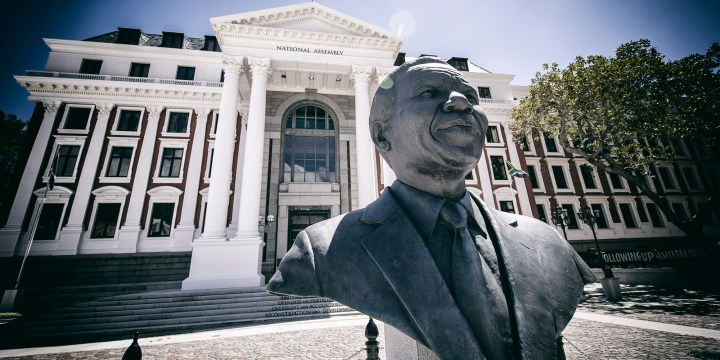PARLIAMENTARY REPORTER’S NOTEBOOK
The unrelenting justice and correctional services workload — or how not to structure committees

The parliamentary justice and correctional services committee’s chock-full in-tray arises from an institutional structural fault — the committee oversees two busy, substantial departments. That Parliament just duplicated the Cabinet set-up signals willingness to be the junior among the spheres of state.
The reason a justice and correctional services parliamentary committee exists is because of a ministry of the same name that straddles both portfolios. The executive, of course, has made easier work for itself – a justice deputy minister and a correctional services deputy minister assist the minister of both departments, and both justice and correctional services have their own directors-general, own budgets and separate staff.
But Parliament, despite its constitutional right to determine its own institutional arrangements, mechanically established the committee to shadow the ministry without heed to the implications.
And so, the justice and correctional services committee legislates for and holds to account two government departments, plus related entities from prosecuting services, the judicial prisons inspectorate and Legal Aid to constitutionally established institutions like the South African Human Rights Commission.
Aside from legislation, work includes doing the constitutional checks on impeaching judges for the House to decide, like the gross misconduct verdict against Judge Nkola Motata for his 2009 drunk driving behaviour, handling proposed salaries of judges, magistrates and heads of the Chapter 9 institutions, and budget-related oversight over both departments and entities.
And that’s not all. MPs’ best efforts are hamstrung.
The tale of the justice and correctional services committee is not only one about an unrelentingly heavy workload. It’s also a reflection of how the legislative sphere of state stoops to the executive over legislation.
Structural fault
This wider law-making structural fault has Cabinet ministers pushing an 11th-hour avalanche of legislation by 4 September – after tabling only 11 of the 42 draft laws in the first eight months of its 2023 executive legislative programme, according to Thursday’s National Assembly programming committee.
Coincidentally, the possibility of completing these draft laws is slight, with an estimated five months in the parliamentary calendar before the 2024 elections anticipated in May.
The justice and correctional services committee this week received the amendment legislation to ensure greater protection against wiretaps, with the 3 February 2024 deadline the Constitutional Court set in its landmark ruling following the amaBhungane challenge.
The amendment Bill to permanently establish the National Prosecuting Authority’s Independent Directorate is expected to be officially tabled in the next few days; it’s been submitted “for information” this week and has been styled as a key delivery on the Zondo Commission recommendations.
Also before the justice and correctional services committee is the Divorce Bill to bring Muslim divorces into the fold after the Constitutional Court two years ago gave Parliament until 27 June 2024 to fix the law.
The Correctional Services Amendment Bill must ensure sufficient independence for the judicial prison inspectorate, or the statutory oversight entity, by the 2 December 2023 deadline the Constitutional Court set.
The Judicial Matters Amendment Bill, to remedy intestate succession and surviving spouses’ support, has missed the 29 June 2023 Constitutional Court deadline – Justice introduced it only in March 2023 – as has the Cannabis for Private Purposes Bill, some two years late, which is now set to be finalised later in September.
None of these draft laws entails mere technical changes; all relate to matters significant to constitutional democracy and the people living in South Africa.
And that’s not quite all the legislative workload, never mind Budget oversight, including the annual report season, over both Justice and Correctional Services, which may have had an easier ride than it should, among all the pressing Justice matters.
Nothing stops the National Assembly from announcing the establishment of separate justice and correctional services committees right now, even if some may grumble about making changes so close to the 2024 elections.
This would not be a politically steeped decision like establishing an oversight committee over the Presidency, as recommended by the Zondo Commission, which has been kicked into touch.
Read more in Daily Maverick: All about performance – Parliament sidesteps decisions on Presidency oversight committee — and more
Questions must be asked on why no one is asking questions. Or if questions are being asked, why nothing changes. Perhaps amid the centralisation of power in the Presidency – or the strategic centre, as the governing ANC jargon goes – the juniorisation of Parliament, also as a legislative rubber stamp, is regarded as acceptable.
And yet Parliament is central to a quality, constitutional democracy based on founding values, including accountability, responsiveness and openness.
Or, as the landmark 2016 Nkandla judgment put it: “(Parliament) is the voice of all South Africans, especially the poor, the voiceless and the least remembered. It is the watchdog of state resources, the enforcer of fiscal discipline and cost-effectiveness for the common good of all our people… (I)t fulfils a pre-eminently unique role of holding the executive accountable for the fulfilment of the promises made to the populace…”
The lesson of the tale of the justice and correctional services committee is that the legislative sphere of the state must organise itself, not to reflect and follow the executive, but for what’s best to fulfil its constitutional responsibilities of legislation, oversight and ensuring accountability. DM



















 Become an Insider
Become an Insider
Comments - Please login in order to comment.